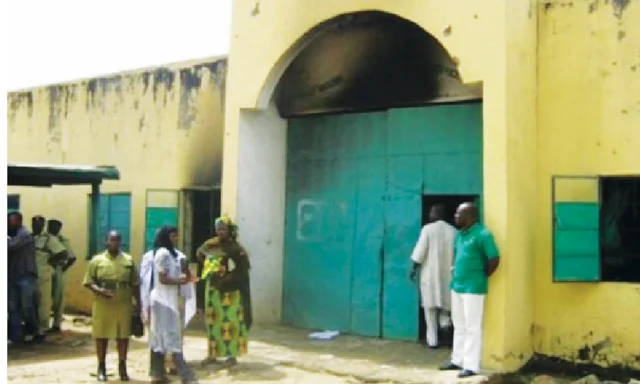• It ’ s being opposed by those who have access to media – Minister
• 8 th Senate rejected proposed law , we will kill it again , vows Abaribe
The Federal Government on Tuesday defended the National Water Resources Bill 2020, saying it was being opposed by people who had access to the media.
It said it would go ahead and ensure the passage of bill because it would be for the good of the country .
The Minister of Information and Culture , Lai Mohammed, said these at a press conference he addressed with the Minister of Water Resources , Suleiman Adamu, in Abuja
He said critics of the bill were ill-informed because they had not read it.
Prominent Nigerians and groups including Nobel Laureate, Prof Wole Soyinka , the Ohanaeze Ndigbo and Afenifere had kicked against the reintroduction of the bill , saying it was a plot by the President Muhammadu Buhari to seize people ’ s water resources for Fulani herdsmen .
But Mohammed on Tuesday said those condemning the bill either had not read it, did not understand its provisions or they were doing so out of mischief .
On his part, Adamu said the bill was never rejected by the eighth Senate as being said in some quarters.
Answering questions from journalists , the minister of information said ,
“ You asked if the government will go ahead with the bill despite the criticism by people and we have just told you that the bill is for the good of the nation .
“ Who are the people that you said are against the bill ? They are people who have access to the media. There is nothing that concerns the people of my village or people of your village with this bill . ”
Mohammed said the bill was for the good of the nation , adding that it had no hidden agenda whatsoever .
He said , “ We cannot rule out deliberate mischief by some of those who have been portraying the bill as a new source of conflict .
“ We are , therefore , using this opportunity to appeal to Nigerians to avail themselves of the provisions of the bill to avoid being misled by those who have chosen to politicise it. ”
“ When passed into law, the National Water Resources Bill 2020 will provide for the enhancement of the Nigeria ’ s water sector in line with global best practices. ”
Faulting the claims by critics , the minister said there was nothing new about the bill which he described as an amalgamation of water resources laws that had been in existence for a long time .
He listed the existing laws that made up the bill as the Water Resources Act , Cap W 2 LFN 2004; the River Basin Development Authority Act , Cap R 9 LFN 2004; the Nigeria Hydrological Services Agency ( Establishment ) Act , Cap N 1100A , LFN 2004; and the National Water Resources Institute Act , Cap N 83 LFN 2004.
He said the different laws were being re – packaged as the National Water Resources Bill 2020 because they were being re- enacted with necessary modifications to bring them in line with current global trends as well as best practices in integrated water resources management .
Mohammed explained, “ The bill provides for professional and efficient management of all surface and ground water for the use of the people ( i . e . for domestic and non -domestic use , irrigation, agricultural purposes , generation of hydro-electric energy , navigation , fisheries and recreation) .
“ The bill will ensure that the nation ’ s water resources are protected , used , developed , conserved, managed and controlled in a sustainable manner for the benefit of all persons.
“ Among other benefits , the bill provides for the creation of an enabling environment for public and private sector investment; provides for capacity building processes to foster good governance ; establishes water use and licensing framework to ensure sustainable financing for water sector development from tariffs. ”
“ The first thing to say is that many of those criticising the bill have not even bothered to read its provisions , thus depending on second -hand information to reach their conclusions. Those who have read it have perhaps done so perfunctorily . ”
The minister thereafter picked some of the points so far raised by critics of the bill and responded to them “ with a view to clearing any misgiving and also enlightening Nigerians. ”
On the claim that the Federal Government would take over the nation ’ s water resources by licensing and commercialising the use of water, Mohammed said that was not the intention because the current Water Resources Act , 2004 already makes provision for this .
He explained, “
This bill is only trying to provide a framework for implementing that provision .
The regulatory provisions of the bill require that commercial borehole drillers obtain a licence .
“ The Code of Practice for Water Well Drillers issued by the Standards Organisation of Nigeria and the NWRI in 2010 already requires this .
“ The code provides technical requirements that a driller must possess to undertake drilling as well as information on such borehole to be provided to the national database.
“ That code however requires the licence to be issued by the NWRI in Kaduna.
This bill provides for such licenses to now be issued by the states , under delegation of the national regulator , the Water Resources Regulatory Commission. ”
He said the borehole regulation was an international standard for abstraction of large volumes of water , adding that most countries in Africa regulate commercial abstraction.
According to him , regulating abstraction of large volume of water is necessary because groundwater abstraction is an activity that has environmental and ecological impact .
On critics who argue that the bill will prevent Nigerians from accessing potable water , hinging their argument on Section 75, the minister explained that a technically -competent driller should not be afraid of obtaining a licence .
Mohammed also responded to critics who said the bill was illegal based on a judgment of the Supreme Court which held that the power of physical planning in any state of the federation was exclusively vested in the state government and that the National Assembly lacked power to legislate on the physical planning outside the FCT.
He said , “ This is not a physical planning bill. This bill only relates to the management of water resources that cross state boundaries.
“ The constitution already grants the federal legislature this responsibility ( item 64, Exclusive Legislative List, CFRN 1999) .
“ The Water Resources Act , 2004 lists the water bodies to which the Act applies. This is maintained in the bill . The interaction of the Federal Government with the state is only as it concerns the management of the inter – state water that passes through the state.
The bill does not apply to water that is wholly within the boundaries of a state. The bill also does not apply to land. It clearly states that land required by any of the institutions established in the bill will be obtained in accordance with the Land Use Act ( i. e with Governor ’ s consent) . ”
On the criticism that the bill , when passed into law, would clip the wings of state and local government authorities, as well as individuals from making use of the water in their backyards without permission from Abuja , Mohammed said , “ Communities on river banks are guaranteed undisturbed use of water as stated in Section 3 of the bill.
“ Also , all occupiers of land are guaranteed the right of abstraction for domestic and sustenance, whether by borehole or rivers .
“ Section 3 reiterates the right of persons to continue to access water without charge for subsistence and preserves existing customary rights to water. ( see Sections 1, 2, and 3 of the Bill ) . Section 2 of the Water Resources Act, 2004 is reproduced.
Also on the criticism that the bill is aimed at taking the resources of a certain part of the country for the use of herders or that the Federal Government is seeking to implement Ruga by subterfuge, the minister said , “
This is not the intent of the bill and it is not even possible as the bill reiterates the fact that land can only be acquired by any of the institutions established in accordance with the Land Use Act. ”
The minister of water resources said the bill was never rejected by the eighth Senate as being said in some quarters.
He said the upper chamber of the National Assembly only set up a committee to look at the issues raised by stakeholders on the bill .
He said , “ The House of Representatives passed the bill and sent it to the Senate for concurrence. Senators asked questions. This was within their rights to do so .
“ The Senate did not throw out the bill in 2018. What it did was that it constituted a committee to look into the issues raised and report back . Before the committee could report back , 2019 election came .
“ When I was returned as minister after the election , I felt I should return the bill to the National Assembly.
“ There was no subterfuge. We followed due process . It is not a Buhari bill . It is a water bill for Nigeria . ”
Eighth Senate rejected water bill, we will kill it again – Abaribe
But the Senate Minority Leader , Enyinnaya Abaribe, faulted the claims by ministers of water resources and his information counterpart on the status of the bill in the eighth Senate .
Abaribe vowed to mobilise his colleagues whose constituents interest would be jeopardised with the passage of the bill , to oppose it if it is brought to the floor of the red Chamberland again .
The Senator in an interview with one of our correspondents on Tuesday, warned the minister of water resources to get his facts rights instead of fielding the public with wrong information.
He said , “ It is unfortunate that the minister was never a lawmaker , otherwise he would have known the processes in passing a bill .
“ When a bill comes for concurrence to the Senate from the House of Representatives for us to either agree or not , and we do not concur , it means that it was rejected.
“ So , trying to come up with such story is very unfortunate . The minister should first get his facts right before fielding the public with incorrect information. ”
You can’ t force water bill on people – Ohanaeze
Also , the apex Igbo socio -cultural organization , Ohanaeze Ndigbo , warned the All Progressives Congress- led administration that no amount of force could subdue the people’ s will.
Ohanaeze ’ s National Publicity Secretary , Prince Uche Achi -Okpaga who spoke to one of our correspondents on the telephone , said that Nigerians had rejected the bill and wondered why the government claimed that the bill was in the interest of the nation .
“ We are not interested whether the eighth National Assembly rejected it or not .
What we are saying is that Nigerians rejected it. The National Assembly, is it not the National Assembly of Nigeria ? Nigerians have rejected the bill in its entirety . ”
The spokesman for the Pan Niger Delta Forum , Ken Robison, during a telephone interview with The PUNCH , said , “
Nigerians are against that bill . They ( FG ) are taking our crude oil and gas resources , they are taking our land . They want to take our waters . We will resist it. ”
The Middle Belt Forum lashed out at the Federal Government saying that going ahead with the water bill against the wish of Nigerians would be insensitivity of the highest order .
The National President of the Middle Belt Forum , Dr Bitrus Porgu , who spoke to one of our correspondents in Jos on Tuesday reminded the Buhari -led regime that it would not stay in power forever
Berating the ministers, the spokesman for the pan-Yoruba group , Afenifere , Yinka Odumakin , asked , “ Are Lai Mohammed and Adamu more informed than Soyinka and all leading groups that have opposed the bill? It only shows the arrogance of the little men with big ego running Nigeria aground presently .
“ The bill is a pernicious one in line with the divisive agenda of this government . For this government to still be insisting on going ahead with it, it shows that this regime is not interested in things that can unite Nigerians but only surviving on our fault lines. ”
The Punch







